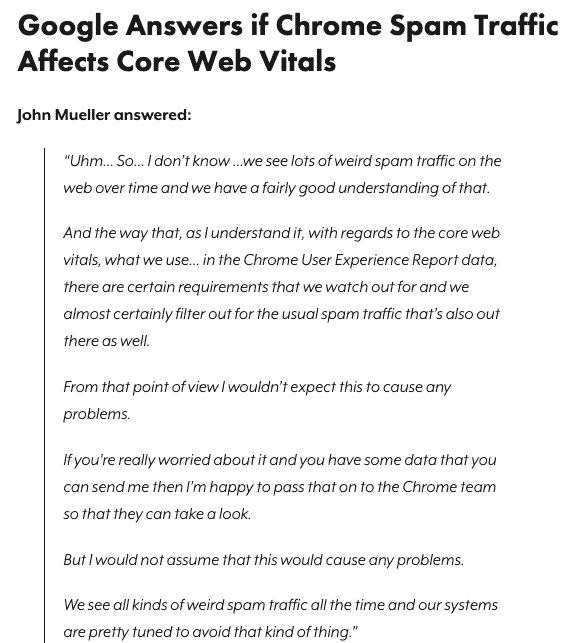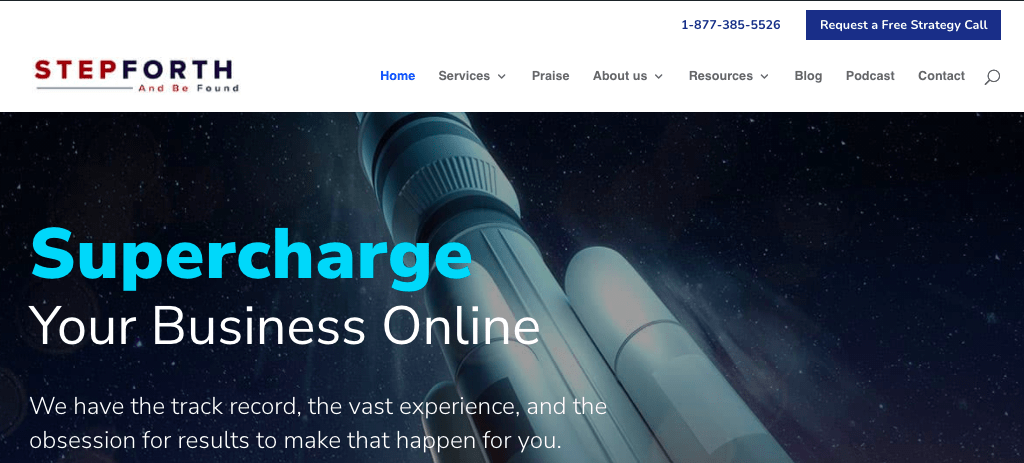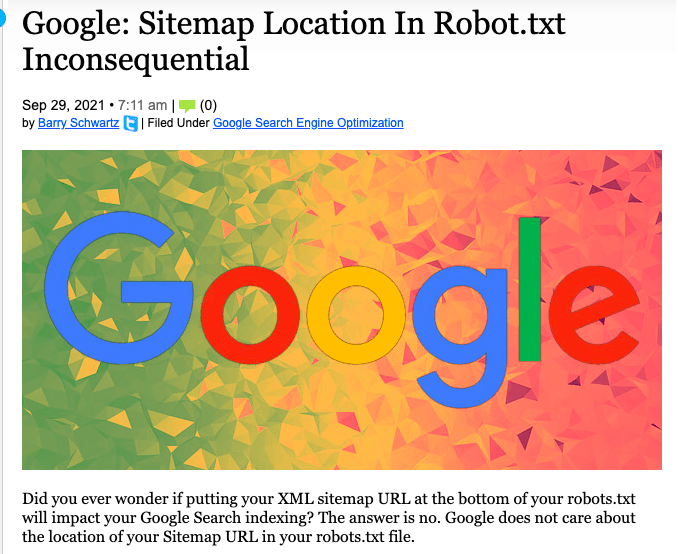A slew of search result enhancements are being seen in the wild and they are providing noticeable changes in search experience. This is coupled with a Google Core algorithm update that has made significant waves. The hosts also discuss some Mueller files, including a thought-provoking question about the possible negative effects of using Chrome Field Data to assess a website’s load time.
Noteworthy links from this episode:
- Big Google Search Ranking Algorithm Update On September 24th and 25th?
- Google search gets larger images, enhances ‘About this result,’ gets more ‘shoppable’ and more
Transcription of Episode 416
Ross: Hello and welcome to SEO 101 on WMR.FM episode number 416. This is Ross Dunn, CEO of StepForth Web Marketing and my co-host is my company’s senior SEO, Scott Van Achte.
Having good day, bud?
Scott: Good afternoon! I am having a weird day. I’m actually, you’re not gonna believe this, trying my very first ever pumpkin spiced latte. I’d never had it.
Ross: Good for you.
Scott: Only because Lindsey happened to just bring me one and it’s weird, I’m used to black coffee and the sweetness is… I’m not sure if I’m digging it but we’ll see.
Ross: Yeah, it is very sweet. No doubt about it.
Well, I actually talked to John Carcutt yesterday, for all those listening, and he may come back on the show occasionally. I’m hoping that’s the case, either all three of us will do it or I’ll give Scott a break, we’ll figure it out.
Scott: Yeah, it could be good on both ends.
Ross: But I think we’re gonna start off with interviewing him, we’ve never done that. I think it’d be really interesting. As everyone knows, he’s been listening to the show for years. He’s got a lot to share and it’s a totally different perspective from ours, or our sort of small-medium business perspective. He’s corporate enterprise level, places like newjersey.com (nj.com) is what he does SEO for so it’s very interesting stuff. We had a good call.
Scott: I’ll have to get some really tough questions for him, then.
Ross: Yes, absolutely. Alright. Well, thank you for creating the show notes today. I was in a sales call up to this very moment so you have command. It’s a search ranking algorithm update. Oh dear, not another one.
Scott: I know. This is definitely the summer of updates, isn’t it? I feel like every show, we’re talking about the latest updates and that seems unusual. Barry Schwartz over at Search Engine Roundtable reported earlier, the week of September 27, that there was a big Google search ranking algorithm update on September 24th or 25th and that’s basically all I’ve got. Nothing has been confirmed by Google. There was some chatter in the communities about that and the various forecasting tools like SEMrush and Moz cast, they all show some activity. I went through and looked at every single one of our clients’ analytics accounts to see if I noticed anything unusual and I really didn’t. I saw one client whose traffic went down a little bit for two days and then bounced back but that could be a weekend related thing, or something else. Another client whose traffic actually went up about 20% and seems to have stayed there. So maybe a result of this update but I would have expected, if it’s as big an update, I would expect to see it more widespread than two clients. Even the comments on Barry’s post don’t say a lot about this update. There isn’t a lot of chatter there. I would actually like anyone that has seen a big change happening that weekend, I think the 24th was a Friday, to go into our Facebook group [SEO101 on WMR.FM] and let us know what you experienced. Maybe share some screenshots if you want. Let us know what you think because currently, I can’t find any information about it with any level of useful detail. This is more of a call for help than it is a reporting of the news.
Ross: Well, I would think too, it’d be good to know if someone does share what industry they’re in because these updates tend to target specific industries as of late or at least certain search intents. Maybe your money or your life, that kind of stuff or tourism, travel. There’s a whole number of things that it could be targeting and that may be why we’re not seeing it. We do have some tourism clients but mainly we have nothing that’s certainly a general target for Google so that’s probably why we skirt around any of the issues most of the time (knock on wood). Interesting. Well, what’s new. There’s always something and good ol’ Barry’s good at outlining them so we’ll see what happens next.
Scott: Absolutely.
Ross: Search results are more visual so apparently there’s been some updates to Google search results. Funny, they must be so small because I haven’t noticed anything significant.
Scott: Yeah, I haven’t seen anything myself and I tried to bring this up. Aside from the Search Engine Land post, which I actually think was also written by Barry, he’s really everywhere, isn’t he?
Ross: He is. It’s nothing but right.
Scott: Yeah. Earlier this week as well, I guess the week of the 27th I should say because I don’t know when you guys are listening to this, it was launched. Google is apparently calling them image universal blocks. The way they look to me, at least in the example in the Search Engine Land article, is if you think about your WordPress or your blog where you’ve usually got your main category pages or your main blog page, you’ve got a big image, the headline and a little blurb — it kind of looks like that but in search results, so at least on mobile. So I’ll be curious to see what happens with that. It sounds like largely, they’re showing up with terms that have the word ‘idea’ as part of the search term. So like “painting ideas,” for example. It’s something that would bring up results that are generally graphical. They’re also appearing for apparel related queries, apparently. Again, I can’t seem to replicate it on my end. It could be a US versus Canada thing. That seems to be the way of a lot of these changes. It could be something to watch out for anyway and maybe reinforce the value of image optimization on your site as well.
Ross: Hmm. It’s interesting, I don’t know why I chose to do this but I was trying to randomly think of a search to do, so I thought, ‘New York hotels.’ When I did that, I was surprised to see a very different map. Oh, maybe it’s not very different. It’s just the way they’ve overlaid the dollar rates and stuff, and how it’s listed. If you try that, it’s a map on the right instead of above, in the local pack and all the rates and stuff are showing for all the various hotels, which is good.
Scott: Oh I see that as well.
Ross: It is sort of unique, I haven’t seen that before. I haven’t exactly been looking at traveling lately.
Scott: It’s not on our radar right now. That’s for sure.
Ross: So anyway, I know a lot of people are. In fact, we get a little jealous hearing about people just traveling without any whim, just going for it. It’s not my cup of tea right now but good for them as long as you do it safely.
Alright, so some changes there, that’s always interesting to watch. You never know whether or not it’s just going to be a long term test or whether or not it’s just a step towards more changes, but we’ll keep an eye out for you.
Scott: Yeah, you never really know but I guess I should say, one thing to keep in mind is probably the best bet, if you want to try to take advantage of it, is to optimize for images a little bit and just a few little tips on what you guys can do:
- First of all, make sure your images are relevant to your content, it kind of goes without saying.
- Make sure your file names are relevant, have a small file size so that everything loads nice and quick.
- Have relevant image alt attributes in place.
- Use responsive images where you can. If you are using something like WordPress or a lot of other content management systems, they will do this for you but if not, make sure that you are sizing images based on screen width, that sort of thing.
- Incorporate a caption if it makes sense to do so.
- Make sure you include image information in your structured data where applicable. So that’s great for product markup and recipes and all kinds of things.
Really focusing and hitting home with some of that stuff will maybe help if this ends up being a long term improvement at Google.
Ross: Awesome. Okay, next up is the “About this” enhancement, yet another enhancement. 
Scott: Is it an ellipsis? No, that’s if it’s horizontal, isn’t it?
Ross: So it’s essentially, all above each other. If you click on that, right next to the listing, it’ll give you an “about this” of this result detail. It just talks about whether or not it’s secure, any kind of basic information about where it’s coming from, whether or not it’s listed in Wikipedia. Apparently, it’s now including ranking information, as of July. Some terms appear in the result, other websites with your search term that link to the result, languages, geographic region. Recently, I guess, it didn’t give it time here, it expanded further to include more information about the result, like “more about this page,” and you’ll sometimes find “web results about this page.” Unfortunately, there is no way right now to report to Google if these results are accurate. This feature has been used 400 million times since February. Not many.
Scott: It’s funny, 400 million sounds just humongous. It sounds gigantic and then I was looking at the numbers. Since it launched, there have been approximately 1.3 trillion searches on Google so suddenly, 400 million seems a little bit small. I think the math worked out to roughly 1 : 3000 people searching are clicking on the vertical ellipsis to find that “about” information so it is being used but certainly by a small percentage of total users.
Ross: Okay. Looking back in our history center to see whether we talked about this but I don’t see anything. Anyway, on that same page at Search Engine Land that talks about these vertical ellipses, did you say?
Scott: A vertical ellipsis, the three dots.
Ross: Okay. Anyway, in that same article, it talks about shoppable search. They’re making it, apparently, Google has made the search experience more “shoppable” for apparel-related queries. That’s all interesting and all but what it triggered to me was something that was discussed recently and it was causing quite a bit of chaos. Apparently, Google is going to be presenting sort of shopping details for cars soon and essentially taking a huge chunk of the traffic away from auto dealers. I feel like we talked about this before, but I can’t find the note so I’m just gonna go ahead here. At any rate, this is really a big concern. Auto dealers, they live and breathe by that traffic coming to their site for people doing price comparisons, looking at more information. If Google takes that away from them, that’s going to have a dramatic impact. I think the comparative had about, I think it was travel, saw a 60% decrease in traffic when Google started doing all the price comparisons and everything within search results. So yeah, once again, they’re going a little overboard in terms of making Google that much more effective for users but certainly going to be causing issues for others. Anyway, it does look good though. I can’t go against that and from a user’s perspective, it’s probably going to help as well. I apologize if I repeated myself, but it certainly is worthwhile if I did.
Scott: Yeah, I don’t believe I’ve spoken about that with you. So if you did, it was some time ago, maybe with John or a guest.
Ross: Could be, there’s so many. I’m on a few podcasts. I do a few podcasts now so it’s good to note. Anyway, What is next here?
Scott: John Mueller was talking a little bit about self-referential canonical tags and how they can help clean up small SEO mistakes. Over at Reddit, somebody had asked about self-referencing canonicals and what the difference between those and normal canonicals are.
Ross: What are they, first?
Scott: Okay, so canonical tag is a tag on a page that references or is used to help eliminate things like duplicate content and things of that nature. For example, if you have a shopping page and you are sorting your, maybe you have shoes and you have different search criteria/ sorting criteria that sorts by size, or by color, and creates unique URLs, you would place a canonical tag referencing a top level page for all of those individual duplicated pages. So Google says, “ignore all these other pages, this is the main page we want to index and rank.” So you may have variables at the end of your page, whatever.com/shoes?sort=whatever and all those other URL variations will then be referenced to /shoes for instance, if that makes sense. If you have those, those are normal canonical tags and that’s good, you want those because you don’t want that duplicate content to be indexed or ranked, really. You want the one variation of the page to be ranked. A lot of people back in the day would not worry about self-referencing canonical tags. If you have a page /shoes, they wouldn’t put the canonical tag on there pointing to /shoes because it’s pointing to itself. What John has said is that, and this is a quote from him on Reddit, I believe, “since you don’t know how people link to your pages, a self-referential one [canonical tag] helps to clean up small mistakes.” So if I link to your website and I add, for whatever reason, some weird variables to the end of my URL string and the link, that can cause a different version of your page to be indexed and it can send some of that link value to the wrong version. If you have a self-referencing canonical tag on that page, that eliminates the problem. The incoming link is then directed essentially, too, even though it may not load, Google will reference the proper canonical link as opposed to the incorrect link.
Ross: It consolidates all forms of the URL to that URL (to the one you want it to be), almost homogenizing it.
Scott: There we go, that’s better. I kind of got lost in my description there. Hopefully it made sense to somebody out there.
Ross: Yeah, so let’s take a quick break and when we come back we’re going to talk about Chrome-based spammers.
Welcome back to SEO 101 on WMR.fm hosted by myself Ross Dunn, CEO of StepForth Web Marketing and my company’s senior SEO Scott Van Achte.
So the question is, can Chrome-based spammers impact core web vitals? Now, this all comes about because Google uses what’s called field data from Chrome use and as a result, and that’s just from general use. So if there’s any problems with accessing your site on a regular basis, it bears some concern. Does Google see that as being an issue that they should be worried about? And are you then in contravention of? Are you doing a good enough job with site speed? So that is a significant issue and someone posed this question quite well to John Mueller. It says, “in the recent week, we’ve seen a huge increase in direct spam traffic on some of our websites, coming from all over the world using Chrome as a browser. This spam traffic is very slow. We’re a bit concerned about Chrome metrics that are used to evaluate page speed and rankings. Is Google aware of this? Is there something that we can do?” So if it is a contributing factor, does that mean that Google might think less of that page? What does Roger say here, Scott?
Scott: So Roger said that his basic interpretation of the underlying question is that, is it possible to launch a negative SEO attack focused on poisoning core web vitals, and thereby affect a known ranking factor? He mentioned that the data is what Google calls field data and is what is used to calculate the core web vitals score that is subsequently used as ranking factors. Do you want to handle John’s answer or do you want me to give it here?
Ross: Sure. What it comes down to is that it’s probably not going to be an issue. He does not expect it to cause any problems. 
Scott: It always comes down to “it depends,” doesn’t it. There was one interesting part there, though, that noted in the article was, if the spam that they’re dealing with is bot spam, Google should be fairly good at interpreting that and eliminating it and not worrying about it. But then what happens if somebody is paying a big group to manually go in using the actual Chrome browser and try to manipulate things? It comes a bit fuzzier because it would be, in a sense, a legitimate actual user and not a bot even though they had bad intentions. So I could see why John, in his response starts off by basically saying, “I don’t know” even though it’s pretty clear that he thinks it will not cause any issues but maybe it could. I wonder if maybe they’re aware that there is potential there and maybe working to close holes?
Ross: Yeah, maybe. It could be that that field data is mostly just used for public facing data, for testing or for the lighthouse system that does the analysis of your pages, and it just has something to compare against. Maybe they have their own tool that they use on a regular basis. I don’t know. It seems to appear based on his response that it is being considered as part of the algorithm now so we’ll see. I guess it’s a good point and I’m sure someone’s going to be on his tail about this to see if there’s any clarity.
Okay, sitemap location in robot.txt inconsequential. I love little things like this. Oftentimes, a lot of people ask very overthought questions. First of all, the robots.txt file is something you put in the root of your website or I guess you can have it in subfolders as well to sort of specify things.
Scott: I believe you can. Not that I see people do that.
Ross: But anyway, the robots.txt files where you can put in which sites you want to block such as block Baidu search engine, block this bot, block this bot, block this SEO research tool, all these things that can take bandwidth out of your site, you can also block specific sections of your site, specific pages from being indexed, or even… all this stuff. It can be done there. It can all be seen, I should say, it’s not like it’s in stone. These are our suggestions that you’d like search engines to follow and it is useful. One of the things you can do is add where your XML sitemap is. An XML sitemap is a quoted page – an XML, that outlines all the different pages on your site that you want indexed and when you want it indexed, and in what order. It’s only a recommendation, Google doesn’t take it to heart completely but it’s a good practice. Anyway, where you put it in within robots.txt doesn’t make a difference, is what this all comes down to. Very simple. There’s maybe something to discuss here, so what do you think, Scott?
Scott: Well yeah, I just figured if we want to get into a little bit more detail about what the XML sitemap is, which you just did. One other note is you should also submit it to Google Search Console. I like tidbits like this because it’s something that never even occurred to me and I’ve never actually had this question from clients even though we get all kinds of simple questions like this. I had never even considered that the location and the robots.txt file might have made a difference. Well, it doesn’t, so I guess that’s good that I had the right mindset there but if you ever wondered, does it matter? should I put it at the top of the text file or the bottom? Well, there you go, do whatever you want, it doesn’t make a difference.
Ross: Perfect. So Christmas season’s coming up and I imagine many people out there with e-commerce are starting to get their butts in gear to ensure they’ve got visibility. I’ve just recently had a call with a wonderful business owner who’s going through some of the troubles of ensuring her website is functional. In their case, their online site was supposed to be 100% their business. They did open a brick and mortar place just to sort of do exactly what I would do, and that is to cover their ass to make sure they got multiple income streams. As it turned out, their brick and mortar has done even better, which has been disappointing to them because they wanted their online to do better. When I looked at their site in this last call, right before our show, I discovered a few things. One was that the designers, and I’ve seen this so often, said they do SEO and they don’t. I mean there is the most basic SEO possible built into the site but not even any local SEO. This is a local business, you need to have your name, address and phone number of both their locations. As it turns out, they’ve opened another one in the footer, and just make things clear to people that there are alternatives and options. Also, their valuable search option within their e-commerce isn’t working on mobile and they didn’t know what percentage of traffic came from mobile versus desktop. That can easily be found from Google Analytics but it does take knowing where to look for it and to find it. Anyway, it really brought to mind that business owners out there who run e-commerce sites and honestly, have been thrown into the deep end thanks to COVID and all of the complexities that that has brought. They’re having a tough time this year. There’s gonna be a lot of people who just don’t have the time or the interest to try and keep on top of this. Maybe they got a business grant to have one built, they just picked a company, they have no idea if the company did a good job. If that’s the case and you’re in that position, it is coming up to October, it’s not too late. Reach out to us, I’m more than happy to walk through a free strategy call with you and just see if there’s anything that’s missing. 
With that said, on behalf of myself, Ross Dunn, CEO of StepForth Web Marketing and my company’s senior SEO, Scott Van Achte. Thank you for joining us today. Remember, we have a show notes newsletter, you can sign up for it at seo101radio.com where you won’t miss a single one and you can refresh your memory of a past show at any time. Keep in mind too, that we finally got that running fairly smoothly now, thanks to my new executive assistant who’s managing that so thank you Carlyn. If you have any questions or any suggestions on how to make the show notes better, let us know. Have a great week and remember to tune in to future episodes which air every week on WMR.FM
Scott: Hey, thanks for listening everybody and remember to keep fit and have fun.
Ross: There you go.


